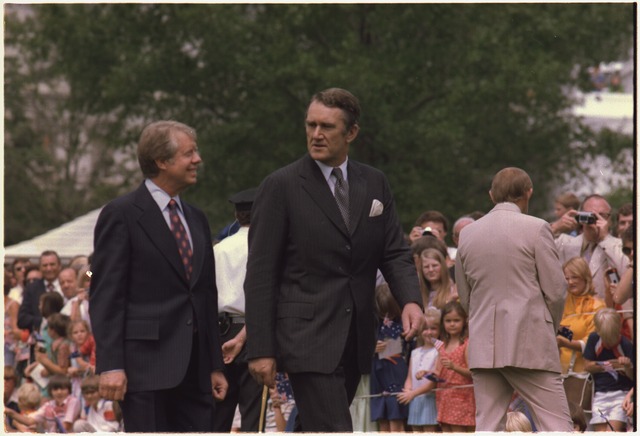 After more than a century of federation, we have a PM pointing us towards armed neutrality, and who doesn’t want to be closely aligned to a great and powerful friend. Granted, it’s a PM who lost the job 30 years ago. But Malcolm Fraser’s re-imagining of himself and his country is fascinating. His book Dangerous Allies takes Australia to a parallel universe where Oz no longer believes in, or needs, the US alliance.
After more than a century of federation, we have a PM pointing us towards armed neutrality, and who doesn’t want to be closely aligned to a great and powerful friend. Granted, it’s a PM who lost the job 30 years ago. But Malcolm Fraser’s re-imagining of himself and his country is fascinating. His book Dangerous Allies takes Australia to a parallel universe where Oz no longer believes in, or needs, the US alliance.
Fraser writes that ‘almost a century of strategic dependence has left an indelible mark on the Australian psyche’. (Hmm…true.) One solution— close Pine Gap. (Hmm…yikes.) He judges that Australia’s habits of dependence and acquiescence mean it’s ‘now more heavily aligned with the US than at any time in our history’. (Hmm…what about MacArthur and the Pacific war?) Fraser says Australia has become a ‘strategic captive’ of the US (Hmm..?) And the former PM thinks we have more to fear from provocative action by the US or Japan than from China. (Hmm…!!!)
For a generation of Australians who remember the Fraser government—and especially for my generation of press gallery hacks—the post-PM evolution of Fraser’s thinking puts the maze into amazing. Channel Lloyd Bentsen (‘I knew JFK…you’re no JFK’) for this book: I knew Malcolm Fraser. I covered Malcolm Fraser’s government. This isn’t Malcolm Fraser.
Sure, we all grow and evolve and sometimes change our minds. But in the case of Malcolm Fraser, the facts haven’t changed as much as he has. The one constant is that Fraser has full confidence in his own judgement. As a tough, realist political leader, Fraser smashed the Whitlam government, scorned the soft internationalism of Jimmy Carter and ordered a panicky rearmament surge for Oz after the Soviet invasion of Afghanistan.
Today, Fraser is equally as decisive. It’s just that his deductions take him to a Green-tinged edge of the Oz polity, far from the Liberals or Labor. Here’s Fraser’s summary of his argument while this is my staccato version of his book:
- Australia’s dependence on the US should’ve ended with the Cold War: ‘There was no longer any fear of attack or any reason for Australia to make its own best interests, and the interests of the region in which we live, subservient to earning the goodwill of the US.’
- Australia is so heavily enmeshed in ‘American military and strategic affairs, in interoperability and in the use of military hardware that it is difficult to distinguish a separate military or strategic destiny’.
- Close Pine Gap, one of the largest US satellite intelligence bases outside America. The Alice Springs facility is now a critical part of America’s offensive capability.
- Australia should weigh-up leaving the Anglo intelligence club of the US, Britain, Canada and New Zealand, if one cost is ‘the idea that we are spying for, and on behalf of, the US’.
- Japan started the latest round of escalation in the East China Sea and Japan’s growing militarism ‘might represent a dangerous factor in future years’.
- China isn’t an imperial power in the sense that European states, the US and the Soviet Union have been imperial powers. ‘China does not represent a threat to the integrity of an independent Australia.’
- With current policies, Australia would have to join the US in a war with China. If the US lost a war with China, America could withdraw to the western hemisphere, leaving Australia, ‘geographically part of the Asia Pacific, but also a defeated ally of a defeated superpower’.
Hacking at the shackles of the alliance leaves little space to discuss what the alternative looks like. The former PM repeatedly talks of the need for Australia to achieve strategic independence, but there’s little discussion of the landscape of this armed-neutrality nirvana.
Fraser discounts the possibility of any threat emerging if Oz opted for strategic independence; the alliance, he says, ‘provides the greatest problem to our future in the region’. He concludes that ‘there are clear costs to strategic independence’ but thinks ‘these costs are insignificant compared to the potential costs involved in continuing our policy of strategic dependence’.
The man who ranks behind only Menzies and Howard in his tenure as a Liberal PM has produced an iconoclast’s lament, a provoking and passionate attack on the orthodoxies of Australian strategy.
Graeme Dobell is the ASPI journalism fellow. Image courtesy of Wikimedia Commons.

